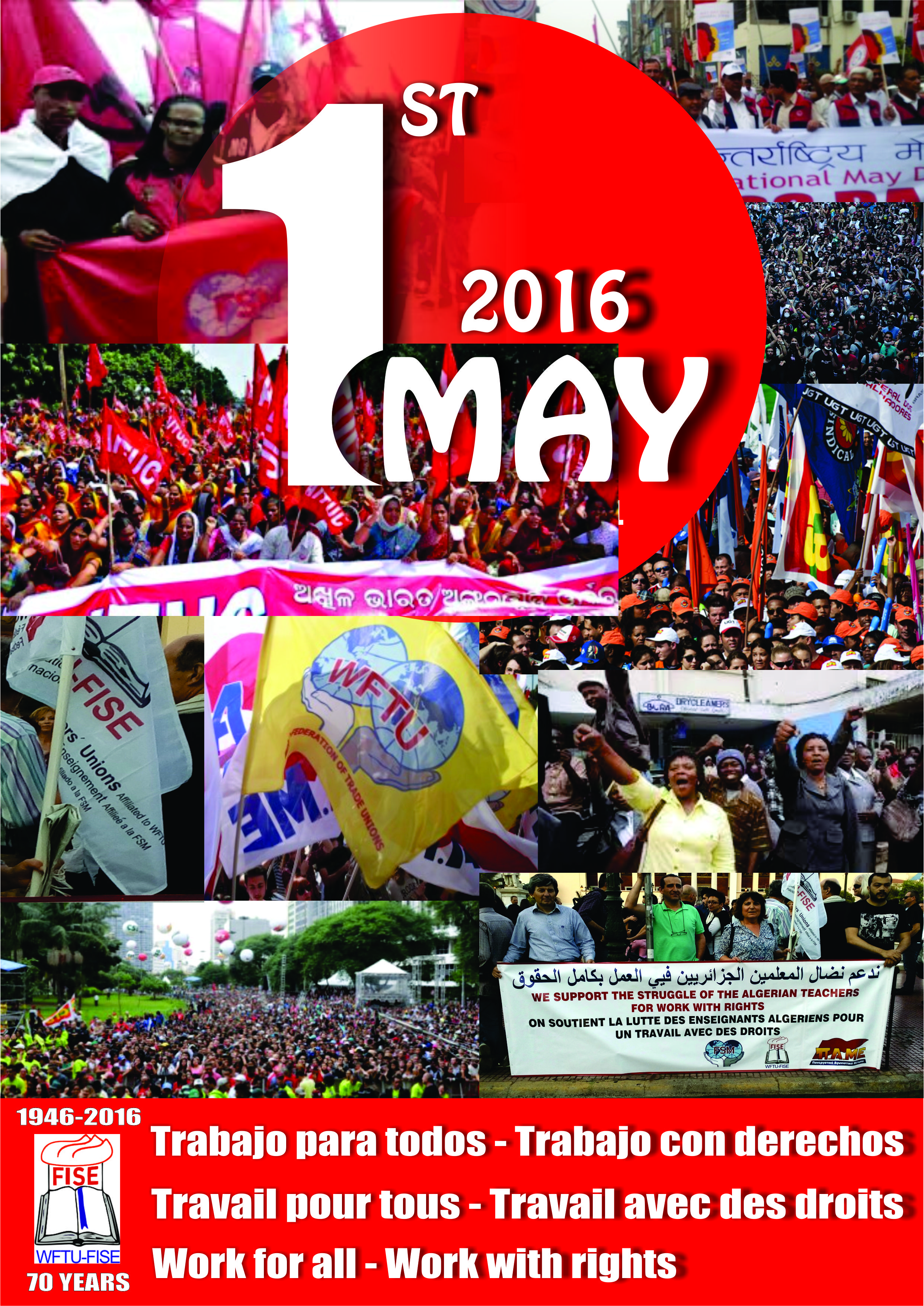May Day 2016: Build Coalitions, struggle for a Common Front
May Day greetings from the Central Executive Committee, Communist Party of Canada
May Day 2016 arrives in an environment where stagnating imperialism seeks to extend its existence, using war, nationalism, militarism, religious fundamentalism and racism to continue its exploitation of the planet and its peoples. Inter-imperialist rivalries for world domination escalate the dangers of war and ecological destruction, to the extent that the survival of our species is a concrete and immediate question. The socialist alternative, first achieved in statehood by the victory of the great proletarian revolution of 1917, is no longer an option but the essence of the struggle for existence. The socialist states that exist, or the development of transitional forms to socialism, are harbingers of the future, the ingredients of salvation. These are the parameters of the global struggle for life, for the continuity of our species.
In Canada, our struggle against an extreme right-wing agenda recently resulted in an electoral defeat of the Harper Tories. The Liberals, a right wing corporate party, were able to benefit from popular anger by campaigning from the left against the Tories, who had situated themselves as the extreme right party of war, environmental destruction, anti-labour policies, police spying, and bigotry. The NDP assisted the Liberals by moving to the right and alienating many voters who wanted change.
What motivates this desire for change? Despite almost daily reports of job creation, the official unemployment rate is close to 8%. Eighty percent of jobs created are part-time and precarious, and one-fifth of all workers are in precarious, temporary jobs. Sixty percent of the unemployed do not qualify for the EI benefits they paid for, and women still earn about 30% less than men. For working people, the possibility of post-secondary education for their children is fast disappearing. Wages have stagnated since the 1970s, user fees are expanding, and labour standards are largely unenforced. Of the 100 poorest communities in Canada, 96 are indigenous. The desperation, hunger, social isolation and inhumanity that is currently exposed in Attawapiskat has been daily existence for the majority of indigenous people since colonization. Is it any wonder that for some, suicide seems preferable to being forced into a life without hope?
Sections of the ruling class have been moved to soften the repression, because of their fear of developing radicalization as discontent grows, especially on the left. Declining living standards, instituted racism, homophobia, state repression, destructive resource extraction on indigenous territories, and a general decline in democracy, are fuelling discontent and political resistance. These sections of the ruling class seek to counter and neutralize this discontent through the new Liberal agenda, to create a new hegemony by addressing the desire for change, at least in words. They offer some concessions in an attempt to recruit co-operation by labour and social justice movements for their TPP and CETA deals, their arms sales, their NATO-compliant military agenda, and their covert support for the overseas crimes of Canadian mining corporations. This is dangerous, because it could entrap labour into its own demise as an agent of the bourgeois agenda.
This move to a new hegemony is responsible for the Liberal government’s moves to appoint more women to the federal Cabinet, to hold an inquiry into the thousands of missing and murdered aboriginal women, and to commit to nation-to-nation negotiations. There is also the promise of massive investment in infrastructure projects to create jobs, the withdrawal of some anti-labour legislation at the federal level, and a general easing of repressive tactics. These decisions are motivated by public campaigning and pressure, and as such should be seen as victories, not gifts. But keep in mind that a commitment to negotiate is not a commitment to resolution, and recognition of status is not a commitment to redress. The steel fist of the bourgeois state may be covered by a velvet glove, but it is still there.
In order to consolidate any gains, the labour and people’s movements must take note of Quebec labour’s example and move the struggle to the workplace and the street. The Quebec Common Front and its allies had the support of the majority of the people, and pressured the Couillard Liberal government with massive protests. Across Canada, similar mobilization is needed, organized in a Common Front democratic alliance of social justice and indigenous movements, with labour as the catalyst. Such mobilizations would enable the working class and its allies to move beyond the limits of social democracy and build mass movements for real change. The example set by working people and democratic national movements in Latin America, although under attack by imperialism, show how masses of people in unity can resist and make gains. All over the world, in Europe, Africa and Asia, millions of people are resisting.
Canadian working people, and those on the periphery of the working class (all those who do not own wealth and exploit others for their existence), their democratic and social organizations, their trade unions, social justice and indigenous movements, women’s, student and LGBTiQ organizations, must look to coalition building and struggles to create a Common Front. The people’s movements will gain substance and direction when they are seized with the possibility of an alternative which is real, achievable and necessary. The ultimate objective of this alternative is socialism, dedicated to the needs of the people and shaped to reflect the class that creates it. A Party of Socialism is also required, and that is the Communist Party of Canada. The CPC is dedicated to working with all peoples and movements to fight for reforms and to build the fightback, leading ever closer to complete emancipation.
On this May Day we honour the struggles of the working class of all lands and countries, and we pledge ourselves to the socialist future of emancipation, peace, prosperity and environmental justice.

